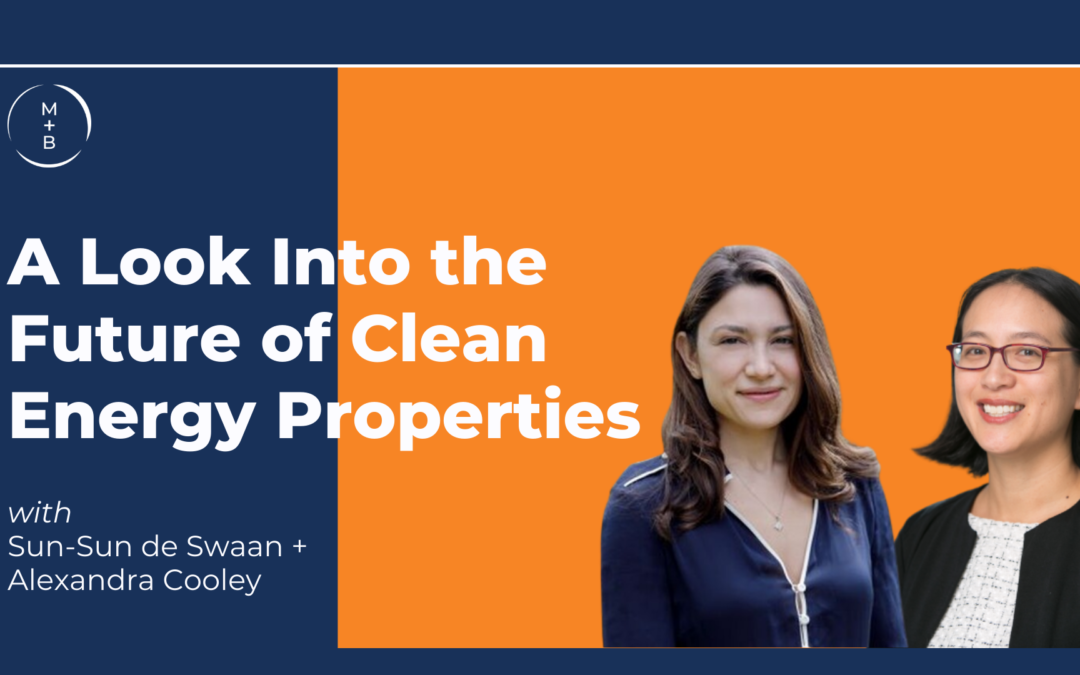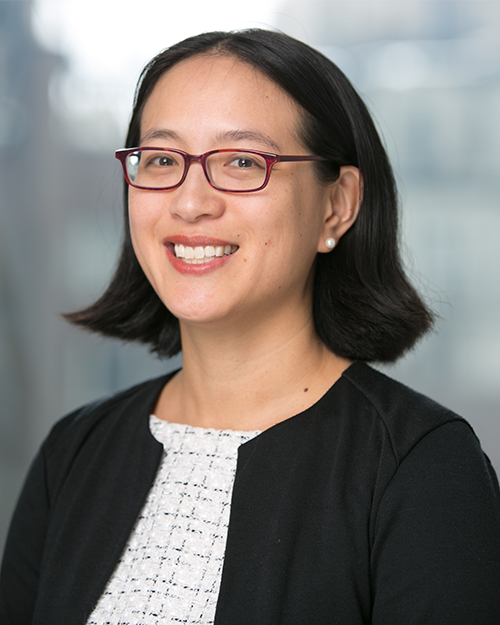McDermott + Bull Managing Director Sun-Sun de Swaan interviews clean energy entrepreneur, Co-Founder, and Chief Investment Officer of Nuveen Green Capital, Alexandra Cooley. During the conversation, they talk about all things commercial property-assessed clean energy (CPACE), from the way this financing model truly works and the property types that use it most, to why it is so important in the future of the clean energy space.
EPISODE TRANSCRIPTIONS
EPISODE 1: What is CPACE Financing?
SUN-SUN: Hi! My guest today is Alexandra Cooley. She is an entrepreneur, focused on financial innovation to scale the adoption of clean energy. Ali is the Co-Founder and Chief Investment Officer of Nuveen Green Capital. She leads the nation’s largest provider of CPACE financing. Ali, thank you so much for being here today.
ALEXANDRA: Thanks for having me, Sun-Sun.
SUN-SUN: All right, let’s jump in. CPACE is a method of financing real estate projects, and it’s been growing rapidly in the past few years. Can we start with the basics and explain what CPACE is?
ALEXANDRA: So, CPACE stands for commercial property assessed clean energy. It is a state level policy where a state will say, “we believe clean energy is a public benefit.” As a result, they will pass a law that will enable private building owners to essentially take advantage of the special assessing powers of the state.
For any of your listeners who own a home or own a piece of property, you will know that special assessments are essentially a way for a municipality or state to raise money for infrastructure projects that are benefiting a specific community or specific group.
The folks that founded CPACE decided, “why can we not use that financing structure to provide and secure financing for these upgrades that are clearly a public benefit: renewable energy and energy efficiency.” They started the process of getting the first states to pass a PACE policy. It just enables building owners to create their own special taxing district on their property and use the proceeds from increasing their property taxes to finance things like solar energy efficiency and other things that the state has said are a public benefit.
EPISODE 2: What Do CPACE Programs Do?
SUN-SUN: What do CPACE programs do?
ALEXANDRA: What became really clear to me during my time at the Green Bank was that it is a particularly acute issue in the CNI market. The reason is because there is a huge diversity of credits. So, if you think about what makes up the commercial real estate market, it’s everything from the office building I’m in which is in midtown Manhattan, to a strip mall in a suburb. It’s very hard to standardize, and that means it’s expensive to lend to you. What PACE does is because it’s so secure and because it is a special assessment, it enables us to go out and raise capital from the most efficient providers of capital — the capital markets going out and issuing rated bonds — which enables us to offer long-term fixed rate money to building owners, which then in turn enables them to make the investments in these energy efficiency and renewable energy upgrades.
EPISODE 3: Why is Financing So Important in the Clean Energy Space?
SUN-SUN: What got you started in this industry, and why is financing so important in the clean energy space?
ALEXANDRA: Right when I was graduating, the state of Connecticut was starting what was called a green bank. Essentially, the Green Bank was a way for small amounts of public money to incentivize private capital to come into the state for clean energy and to create new financing structures to incentivize clean energy. The reason financing is so important in the clean energy space and the decarbonization space is because you are asking for a large amount of capital up front for small operational savings over time whenever you ask businesses and people to invest in clean energy or energy efficiency. That just is not something that people want to do. We know that because we have auto-financing and we have mortgage financing. It is just not something that people like doing, or in many cases, can do.
EPISODE 4: How Did Nuveen Green Capital Start?
SUN-SUN: How did Nuveen Green Capital start?
ALEXANDRA: My first day at the Green Bank, I met my now Co-Founder, Jessica Bailey. She had spent about a decade looking at this policy, getting really excited about its ability to scale clean energy, and getting frustrated that there was not more traction. So, she came over to the Green Bank to start a CPACE program.
We met on her first day, and we started working together on building the CPACE program in Connecticut, which ended up becoming a very successful program. We figured out how to put the money out, how to get the money in, and how to underwrite the asset so that the ultimate funders — the capital markets — would rate it and buy bonds issued. We started getting calls from other states that said, “We really like what you did in Connecticut. Can you help us create CPACE programs in our state?” As state employees in Connecticut, we couldn’t really do that, so we decided to leave and started Greenworks in 2015. Since then, we have since grown into one of the nation’s largest providers of CPACE financing.
EPISODE 5: What Property Types Are Most Commonly Seen in the CPACE Space?
SUN-SUN: What property types are most commonly seen in CPACE financing?
ALEXANDRA: It’s a great tool for most of the commercial real estate industry, but because of the credit underwriting we do that I mentioned, there are certain types that we look at more. Really what we’re looking for is repurposability of the underlying property in terms of location and property type. So about 70% of our portfolio — and I think this is pretty standard across the industry — is multifamily, hospitality, and office. We really like hospitality. There is some idiosyncratic operator risk, but in general they tend to be located close to population demand and highly repurposable in terms of the building type — they aren’t built in some sort of crazy shape — so they tend to be pretty repurposable into office or multifamily. So, we actually really like hospitality. During COVID, as other sources of liquidity pulled back from that industry, we were able to provide long-term fixed rate patient capital.
Then multifamily has been a huge growth sector, which is interesting because it’s very competitive in terms of capital. A lot of people have been going after the multifamily sector. However, what we found is because of the rising rate environment that we’re in, the sector has been so competitive for so long that cap rates have fallen really dramatically. So, changes in interest rates have really hit these developers’ bottom line, and they’re now looking for that fixed rate secure financing that can help them mitigate some of that risk.
Sun-Sun de Swaan
Managing Director
sdeswaan@mbexec.com
Sun-Sun de Swaan serves as a Managing Director at McDermott + Bull in the New York office where she leads the firm’s real estate practice. Sun-Sun brings over 20 years of real estate experience and works with clients across the sector, including firms involved with investment, development, financing, and property management. She has experience in a variety of functions across the industry, shaping her expertise and ability to deliver best-in-class talent to clients across the board.


